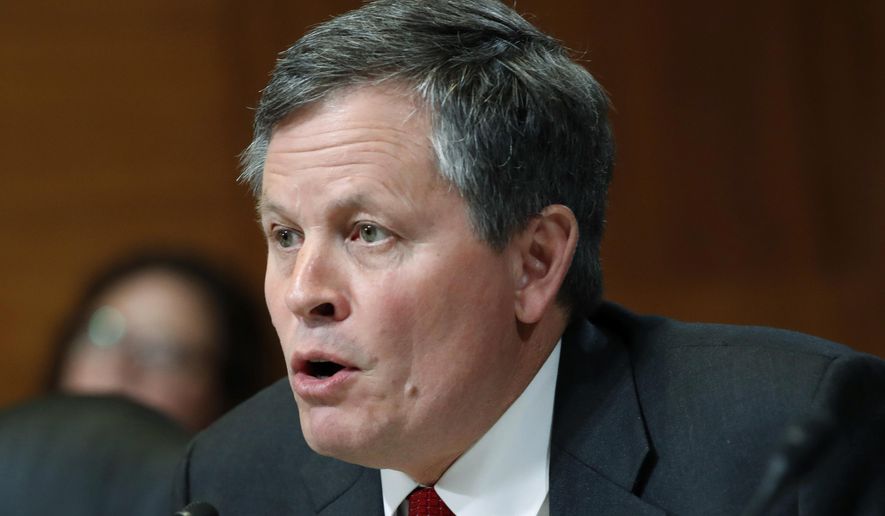OPINION:
In the last 20 years, Senate candidates have tended to win or lose in tandem with the presidential candidates of their party. For the Republicans trying to hold their control of the Senate in 2020, that may be a mixed blessing. President Trump — whether he wins or loses his own re-election bid — will have a profound effect on crucial Senate races in Arizona, Colorado, North Carolina and Montana.
If Mr. Biden wins, the Democrats will only need to pick-up three Senate seats to seize control. To maintain the majority, Republicans will need good Senate candidates to run good campaigns in a handful of states.
One of those states is Montana, where the re-election effort of Sen. Steve Daines could determine whether the Republicans will retain control of the Senate after 2020. That should probably make you feel better if you are a Republican.
For those who missed it, Mr. Daines’ opponent is Gov. Steve Bullock, who is coming off a dismal showing in the Democratic presidential primary. Many strategists consider Mr. Bullock to be a very difficult candidate to beat in Montana but the numbers suggest a different story.
In his first campaign for governor in 2012, Mr. Bullock won with an underwhelming 48.9% of the vote. In 2016, he didn’t exactly dazzle either, winning with 50.2%.
On the same ballot in 2012, Mr. Daines won Montana’s only House seat with 53.3% of the vote. In that 2012 when they were on the same ballot (but not for the same office), Mr. Daines received considerably more votes than did Mr. Bullock (255,468 vs. 236,450).
Improving on his statewide performance, in 2014, Mr. Daines won his first race for Senate with 57.8% of the vote.
Mr. Daines has been running hard, no doubt in anticipation of Mr. Bullock’s flaming out of the Democratic presidential primary, and is outperforming Mr. Bullock in the fundamental skill of politics, fundraising. To date, the incumbent has raised almost $11 million, and has about 6 million dollars in the bank. Mr. Bullock, partially due to a slow start after the presidential primary, has about $3 million in the bank
The governor is vulnerable on the national Rorschach test that is the coronavirus. Despite Montana being at or near the bottom with respect to hospitalizations and deaths (per capita), Mr. Bullock has reopened the state and its economy grudgingly and fitfully. As recently as June 1, the substantial tourist economy in Montana was stalled by a 14-day quarantine for out-of-state visitors.
Mr. Bullock is also almost certainly vulnerable on stances taken during the Democratic presidential primary process, not least among them endorsing the ban on assault rifles. This vulnerability was obvious in the wake of the state’s recent primary, the morning after which Mr. Daines invited Mr. Bullock to participate in four debates. The Bullock team wanted no part of that and has refused to commit to any debates.
The primary results themselves give us some clues about November. In Montana, there were about 60,000 more votes cast in the Republican primary than in 2016. That suggests either more enthusiasm, or a better turnout effort, or both.
In that GOP primary, Mr. Daines won more votes than any candidate, Republican or Democrat, in Montana primary history. In a primary marked by high turnout (55%) the senator received about 48,000 more votes than Mr. Bullock.
If the primary turnout is indicative, it is likely that turnout for the general election will be around 75%. In Montana, this means about 140,000 more voters in the general election than the primaries. Mr. Bullock will need to win most of those voters — at least 2/3 — to win.
More importantly for both candidates, Mr. Trump received more than 199,000 votes in that primary while all Democratic candidates for president received about 145,000 votes. That the president outpolled the combined vote for Democrats at the top of the ticket by more than 15 percentage points, and that Mr. Daines’ results closely track those of the president, is bad news for the challenger.
But it’s good news for the Republicans and Mr. Daines.
• Michael McKenna, a columnist for The Washington Times, is the president of MWR Strategies. He was most recently a deputy assistant to the president and deputy director of the Office of Legislative Affairs at the White House.




Please read our comment policy before commenting.